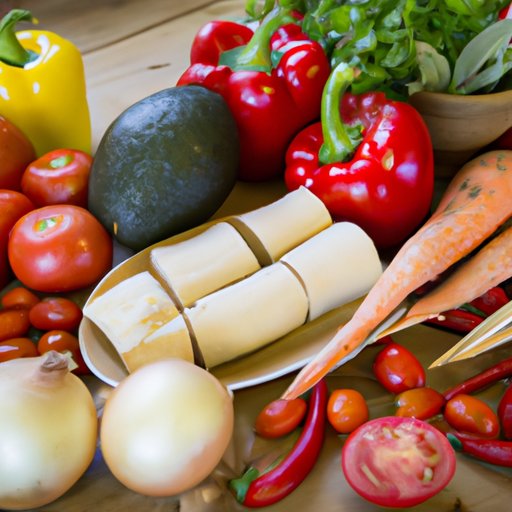
I. Introduction
If you’re following a gluten-free diet, you may be wondering, are vegetables gluten-free? When it comes to eating gluten-free, vegetables are a safe and delicious food option that are naturally free of gluten. In this article, we’ll provide a guide to gluten-free vegetables, including a comprehensive list of vegetables that are naturally gluten-free and tips for purchasing and preparing them.
II. The Ultimate Guide to Gluten-Free Vegetables: A List of Safe Options
If you’re looking to diversify your meals and want a list of vegetables that are completely gluten-free, we’ve got you covered. Here’s a list of vegetables that are traditionally gluten-free:
- Artichokes
- Arugula
- Asparagus
- Beets
- Bell peppers
- Broccoli
- Brussel sprouts
- Cabbage
- Carrots
- Cauliflower
- Celery
- Cucumber
- Eggplant
- Kale
- Lettuce
- Mushrooms
- Onions
- Parsnips
- Peas
- Potatoes
- Pumpkin
- Radishes
- Spinach
- Squash
- Swiss chard
- Tomatoes
- Zucchini
While these vegetables are naturally gluten-free, cross-contamination is always a concern. For example, if vegetables are grown in fields contaminated with wheat or processed in factories with gluten-containing products, they may eventually be cross-contaminated. Always double-check food labels and do your research before making purchases.
If you’re cooking vegetables at home, make sure your kitchen is clean and use separate utensils when preparing gluten-free and gluten-containing foods. If you’re eating out at a restaurant, ask the staff about their gluten-free options and food preparation methods.
III. Navigating the Gluten-Free Lifestyle: Are Vegetables Safe to Eat?
People on a gluten-free diet often have concerns about consuming vegetables. It’s important to note that gluten is a protein that is found in grains such as wheat, barley, and rye, and not typically in vegetables.
While it’s rare, some vegetable products may contain gluten if they have been processed with wheat flour or other gluten-containing ingredients. For example, canned vegetables may be thickened with flour or other gluten-containing additives. When shopping for vegetable products, always check the labels carefully to make sure they’re gluten-free.
IV. Gluten-Free Eating Made Easy: How Vegetables Fit into Your Diet
Vegetables are an important part of any healthy and balanced diet, especially a gluten-free diet where alternative carbohydrate sources may be limited. Vegetables are rich in a variety of micronutrients, including vitamins and minerals, and can help boost your immune system and reduce the risk of chronic diseases.
There are numerous ways to incorporate vegetables into your gluten-free diet while keeping your meals exciting and flavorful. Roasting, grilling, and sautéing vegetables are all popular techniques that bring out their natural flavors. Additionally, adding fresh herbs and spices can enhance the flavor profiles of your veggies.
Here are some recipe ideas for gluten-free meals that feature vegetables:
- Vegetable stir-fry with gluten-free rice or quinoa
- Cauliflower pizza crust with your favorite vegetable toppings
- Butternut squash or sweet potato soup
- Vegetable curry with gluten-free naan bread
- Roasted vegetable salad with gluten-free croutons or quinoa
V. A Closer Look at Gluten: Can Vegetables Cause Harm?
Some people have misconceptions about gluten in vegetables. Unlike grains, vegetables are naturally gluten-free and should not contain any gluten unless they have been cross-contaminated with gluten-containing grains in the production process. A study in the Journal of Agriculture and Food Chemistry found that less than 0.25 milligrams of gluten per kilogram of a vegetable is required to cause an allergic reaction in people intolerant to gluten. This is an incredibly small amount and is not typically found in vegetables.
However, cross-contamination can still pose a risk if vegetables are prepared in restaurants or other public settings. When eating out, always inform restaurant staff of your dietary restrictions and ask about their gluten-free options. Additionally, it’s helpful to research the restaurant ahead of time to ensure they take proper measures to prevent cross-contamination of gluten-containing ingredients.
VI. Gluten-Free and Healthy: Incorporating Vegetables into Your Meals
When following a gluten-free lifestyle, it’s important to prioritize healthy and balanced meals. Vegetables are a great source of fiber, vitamins, and minerals, and can help you achieve your daily nutritional goals.
If you’re looking to incorporate more vegetables into your meals, try to plan your meals ahead of time and make sure you’re getting a variety of colors and nutrients. Additionally, try experimenting with new recipes to keep your meals exciting and enjoyable.
VII. The Benefits of Eating Gluten-Free Vegetables for a Balanced Diet
In summary, vegetables are a safe and essential component of a gluten-free diet. They’re rich in nutrients and can help reduce the risk of chronic diseases. By incorporating a variety of vegetables into your meals and being diligent about cross-contamination risks, you can enjoy the many benefits of a gluten-free lifestyle.
We hope this guide has been helpful in answering your questions about gluten-free vegetables and has provided you with some great meal ideas. Now, it’s time to get cooking!
VIII. Conclusion
As you can see, vegetables are a delicious and nutritious addition to any diet. While it may seem daunting to navigate the ins and outs of a gluten-free diet, by educating yourself about gluten-free vegetables and taking proper precautions to avoid cross-contamination, you can enjoy all the health benefits that vegetables have to offer.
Keep experimenting with new recipes and ingredients to keep your meals exciting and enjoyable, and don’t forget to prioritize your health and well-being by incorporating a variety of fruits and vegetables into your daily diet.




